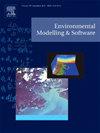差分进化优化混合动力XGBoost精确碳排放预测
IF 4.6
2区 环境科学与生态学
Q1 COMPUTER SCIENCE, INTERDISCIPLINARY APPLICATIONS
引用次数: 0
摘要
碳排放预测是应对气候变化、支持绿色发展的重要内容。碳排放受到经济、人口、新能源发电等复杂因素的影响。传统方法难以应对这些不确定性,而机器学习提供了数据驱动的解决方案。然而,一些模型缺乏数据选择策略,导致忽略了关键特征。为了解决这个问题,本文提出了一种差分进化优化混合XGBoost (DEOH-XGBoost)方法。DEOH-XGBoost包括三个主要部分:特征工程、模型构建和模型集成。首先,在每个关联分析中,通过模糊隶属函数选择特征。其次,在每个特征集上构建基于xgboost的模型,分别进行预测。第三,采用差分进化优化加权策略对模型进行整合。因此,DEOH-XGBoost有效地揭示了多类型数据之间的内在联系,实现了准确的碳排放预测。大量实验表明,我们的DEOH-XGBoost的预测精度明显优于相关的最先进的方法。我们的源代码和数据集可以在以下链接中找到:https://github.com/lingfei0804/DEOHXGBOOST。本文章由计算机程序翻译,如有差异,请以英文原文为准。
A differential evolution optimized hybrid XGBoost for accurate carbon emission prediction
Predicting carbon emissions is essential for combating climate change and supporting green development. Carbon emissions are influenced by complex factors, such as economy, population and new energy generation. Traditional methods struggle with these uncertainties, while machine learning offers data-driven solutions. However, some models lack data selection strategies, resulting in the neglect of critical features. To tackle this issue, this paper proposes a Differential Evolution Optimized Hybrid XGBoost (DEOH-XGBoost) approach. DEOH-XGBoost includes three main components: feature engineering, model construction, and model integration. First, in each correlation analysis, features are selected through fuzzy membership functions. Second, XGBoost-based models are constructed on each feature set to predict separately. Third, the models are integrated by a differential evolution optimized weighting strategy. As such, DEOH-XGBoost effectively uncovers the intrinsic connections between multi-type data to achieve accurate carbon emission prediction. Extensive experiments demonstrate that our DEOH-XGBoost has significantly better prediction accuracy than related state-of-the-art methods. Our source code and datasets can be found at the following link: https://github.com/lingfei0804/DEOHXGBOOST.
求助全文
通过发布文献求助,成功后即可免费获取论文全文。
去求助
来源期刊

Environmental Modelling & Software
工程技术-工程:环境
CiteScore
9.30
自引率
8.20%
发文量
241
审稿时长
60 days
期刊介绍:
Environmental Modelling & Software publishes contributions, in the form of research articles, reviews and short communications, on recent advances in environmental modelling and/or software. The aim is to improve our capacity to represent, understand, predict or manage the behaviour of environmental systems at all practical scales, and to communicate those improvements to a wide scientific and professional audience.
 求助内容:
求助内容: 应助结果提醒方式:
应助结果提醒方式:


